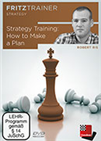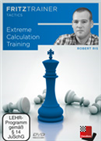MMMG #6: Nerve-wracking
Robert Ris was born in Amstelveen, The Netherlands in 1988, and after learning the rules of the game at 7 he managed to get his IM title at 18. By then, however, he had already started passing his knowledge in schools, chess clubs, with private classes and online training. As he states on his official website, “Sharing my experiences with my students is at least as enjoyable and rewarding [as fighting to become a grandmaster]”.
Focusing on teaching chess made him a great communicator of ideas and a prolific content creator. In fact, he has been presenting his own Fast & Furious show on the PlayChess server since 2012! He has also produced no fewer than fourteen ChessBase DVDs and has authored books for Thinkers Publishing — recently, his “The Modernized Sveshnikov” has been released.
That their trainer is so well-informed helps his students, as noted by one of his pupils:
Robert is an active, passionate player and teacher for the years I’ve known him. The focus of our training was working on my opening repertoire. His precise, in-depth analyzes were very up to date and relevant in practice.
In his most memorable game, Ris takes us through his last-round win at the 2002 Dutch Open.

An enthusiastic coach
Below we present the highlights of the annotations sent by the author. The full analysis can be found in a replayable board at the end of the article.
For my most memorable game I’d like to take you back to my last round game of the Dutch Open U20 in 2002, when I was 14 years old.
In the previous editions of this event I had been doing pretty well, winning the U12 in 1999 and sharing first in 2001 in the U14 category (even though I blew my one-point lead by losing in the last round, which actually brings back some of my most painful chess memories!). The next year I decided to play in the highest youth category, as I thought it would be more challenging playing more experienced youngsters. Being seeded around number 20 by rating, I entered the tournament pretty relaxed, without too many expectations. But once you enter the final round in the shared lead (6.5/8) and your main competitor makes a quick draw, you realise tournament victory is within reach.
I can’t remember I ever felt that amount of pressure during a game! That feeling in combination with the desirable outcome makes it one of those happy chess experiences that I cherish dearly. We are not talking about the quality of play (it isn't the best game), but the entertainment value compensates a lot — at least for me, as a go through this nerve-wracking game almost 18 years later.
Ris, Robert vs. Snuverink, Michiel
U20 Dutch Open - Hengelo, Netherlands
1.e4 e5 2.Nf3 Nc6 3.Bb5 a6 4.Ba4 Nf6 5.0-0 Be7 6.Re1 b5 7.Bb3 0-0 8.h3 Re8 9.c3 Bf8 10.d4 d6 11.Nbd2 Na5 12.Bc2 c5 13.Nf1 Bd7 14.Bg5
14...Nc4? Missing a little tactical idea, weakening Black's kingside.
15.dxe5! dxe5 16.Bxf6 gxf6 17.b3
There are options for White here as well, including ambitious ones, as giving up the pawn on b2 for developing an initiative on the kingside. However, as I didn’t see anything convincing, I decided to play it safe.
17...Na3 18.Qc1 Nxc2 19.Qxc2 f5!? 20.exf5 Qf6?
 In every game of chess, there comes a moment when one is confronted with the question: what should I do now?
In every game of chess, there comes a moment when one is confronted with the question: what should I do now?
This is a mistake, as I’m able to keep my extra pawn without allowing any counterplay.
21.Ng3 Bc6 22.Nd2 Qh4 23.Nde4 Bh6 24.Qe2 Not really a bad move, but playing for the trade of pieces (Qg4) is a bit too simplistic and later almost costs me tournament victory.
24...Kh8 25.Nd6 Re7 26.f6 Qxf6 27.Ngf5 Rg8 28.f3?
Just awful! Overwhelmed by the pressure (on the clock and the tournament situation), I simply trusted my opponent.
28...Bf4! 29.Nxe7 Qxe7 30.Rad1 Bd7?
The bishop was actually quite well placed on the long diagonal, targeting the white king.
31.Qe4! Qf6 32.g4?! The threats along the g-file (and on the h3-pawn) were unbearable.
32...Be6 33.Re2 Qh4 34.Nf5 Qxh3 35.Rg2 h5 36.Rdd2 Bxf5 37.Qxf5 Qxf3??
Now I hear myself telling my students: Look at forcing moves first! [37...Be3+!]
38.Qf6+ Rg7 39.Rdf2?? Qe3 40.gxh5 Qe1+ 41.Rf1 Qe3+ 42.Rff2 Bg3??
 Special attention will be paid to Intermediate Moves, Quiet Moves, Sacrifices on Empty Squares, Mating Patterns, Ignoring Opponents Threat, Calculation in Defence and Method of Comparison. Plus 50 interactive examples to test your knowledge.
Special attention will be paid to Intermediate Moves, Quiet Moves, Sacrifices on Empty Squares, Mating Patterns, Ignoring Opponents Threat, Calculation in Defence and Method of Comparison. Plus 50 interactive examples to test your knowledge.
43.Kh1!
I felt relieved to consolidate my king's position and quickly spotted the sequence played in the game.
43...Qe1+ 44.Rf1 Qe4 45.h6 Qxg2+ 46.Kxg2 Bh4+ 47.Kf3??
Played instantly, not having seen 47.Qxg7# at all. I can't remember ever to have missed a forced mate twice during one game. The good thing is that I didn’t realize both blunders during the game at all and entered the remaining ending full of confidence.
47...Bxf6 48.hxg7+ Bxg7 49.Ke4 Kg8 50.c4 bxc4 51.bxc4 f6 52.Kd5?
I just thought that after picking up the pawn on c5 the game is over, but a much more technical way of converting is to keep the pawns blockaded with the king.
52...Kf7 53.Kxc5 Ke6 54.Kb6 e4 55.c5 f5 56.c6 Be5 57.Re1 Kd5 58.Rd1+ Ke6 59.Re1 Kd5 60.Rc1 Ke6! 61.c7
61...Bxc7+ 62.Rxc7 e3 63.Rc8! The only move
63...Kd5 64.Rd8+ Ke4 65.Kc5 f4?
The final and decisive blunder. The position is still drawn after [65...e2! 66.Kc4 Ke3 67. Re8+ Kf2 68.Kd4 a5 69.a4 e1=Q 70.Rxe1 Kxe1 71.Ke5 Kd2 72.Kxf5 Kc3 73.Ke4=]
66.Kc4 f3 67.Re8+ Kf4 68.Kd3 e2 69.Kd2 Kg3 70.Ke1 Kf4 71.Kf2 Kg4 72.Re3
1-0
Full annotations
Pattern recognition is an important tool in modern chess, as it helps you to understand better the characteristics of a position. Particularly when you have been confronted with a surprise opening system played by your opponent, it helps when you can just
Links
























